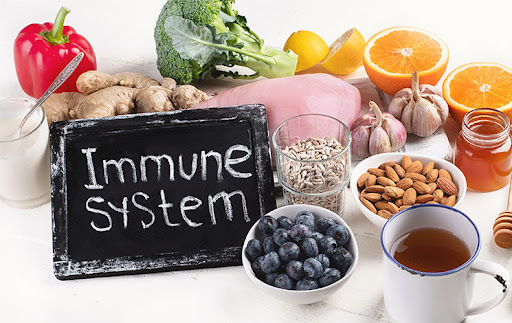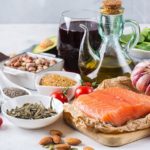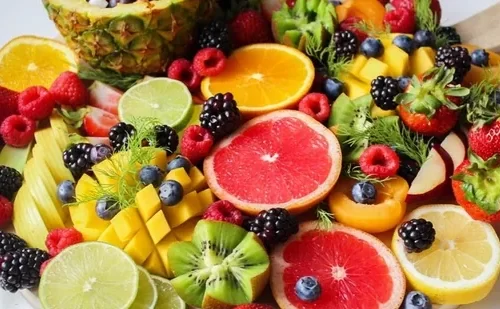Here are Foods To Fight Infections
Foods to fight infections are quite imperative as a robust immune system is essential for maintaining good health, as it serves as the body’s primary defense mechanism against harmful invaders.
Various immune-boosting foods, such as berries, oily fish, turmeric, and kefir, are packed with nutrients that help fortify the immune system, ensuring it can function optimally.
The immune system is a complex network composed of organs, cells, tissues, and proteins. Together, they carry out processes that protect the body by identifying and neutralizing pathogens, which include viruses, bacteria, and other foreign substances that can lead to infections and diseases.
When the immune system detects a pathogen, it triggers a response to eliminate the threat. This response involves the production of antibodies, which attach to specific proteins on the pathogen’s surface, known as antigens, effectively neutralizing them and preventing further harm.
Including nutrient-rich foods in one’s diet can enhance the body’s immune response, helping to fend off illnesses more efficiently. So, which foods are particularly beneficial for boosting the immune system?
List of Foods to Fight Infections
A well-balanced, nutritious diet plays a crucial role in promoting overall wellness, and the following foods have been shown to help strengthen the immune system:
Blueberries
Blueberries are rich in a flavonoid called anthocyanin, which has potent antioxidant properties. These antioxidants help protect the immune system by bolstering the respiratory tract’s defenses. A 2016 study found that individuals who consumed flavonoid-rich foods were less likely to develop upper respiratory infections, such as the common cold.
Dark Chocolate
Dark chocolate contains the antioxidant theobromine, which may help boost the immune system by protecting the body’s cells from damage caused by free radicals. Free radicals are unstable molecules produced when the body metabolizes food or encounters environmental pollutants. Over time, free radical damage can contribute to various diseases.
Despite its immune-supporting benefits, dark chocolate is high in calories and saturated fats, so it should be consumed in moderation.
By regularly incorporating such foods into your diet, you can support and strengthen your immune system, helping your body stay resilient in the face of potential threats.
Turmeric
Turmeric, a vibrant yellow spice commonly used in cooking and traditional medicine, is known for its immune-boosting properties. The active compound in turmeric, curcumin, plays a key role in enhancing the immune response due to its antioxidant and anti-inflammatory effects.
A 2017 review highlighted curcumin’s ability to combat oxidative stress and inflammation, both of which can weaken the immune system.
Garlic
Garlic has long been regarded as a natural remedy for colds and other illnesses. Rich in allicin, a sulfur compound known for its immune-boosting properties, garlic may help reduce the likelihood of catching a cold.
A study found that participants taking garlic supplements experienced fewer colds compared to those given a placebo. While the findings are promising, researchers agree that further studies are needed to conclusively determine garlic’s effectiveness in preventing colds.
Oily Fish
Oily fish such as salmon, tuna, and mackerel are rich in omega-3 fatty acids, which have been shown to support immune health. A 2014 report suggests that regular, long-term consumption of omega-3s may lower the risk of developing autoimmune conditions like rheumatoid arthritis (RA), a disease where the immune system mistakenly attacks healthy tissues.
Broccoli
Broccoli is a powerhouse vegetable, loaded with vitamin C and potent antioxidants like sulforaphane. These nutrients work together to enhance the immune system, making broccoli a great food to include regularly in your diet for immune health.
Sweet Potatoes
Sweet potatoes are packed with beta carotene, an antioxidant that gives them their distinctive orange color. Beta carotene is converted into vitamin A in the body, which helps maintain healthy skin, the body’s first line of defense against harmful pathogens. It may also provide some protection against UV damage.
Spinach
Spinach is a nutrient-dense food that provides essential vitamins and antioxidants, including flavonoids, carotenoids, vitamin C, and vitamin E. Both vitamins C and E are known for their immune-supporting functions, while flavonoids may help protect against common illnesses like the cold by boosting overall immune function.
Ginger
Widely used in teas, dishes, and desserts, ginger is celebrated for its anti-inflammatory and antioxidant properties. Some studies suggest that ginger may offer various health benefits, such as reducing inflammation and boosting immune responses. However, more research is needed to confirm its effectiveness in preventing illnesses.
Garlic
Garlic earns a second mention for its immune-enhancing potential. The active ingredient, allicin, is thought to strengthen immune defense mechanisms and reduce the severity and frequency of colds. However, like with ginger, additional research is needed to fully understand its impact on the immune system.
Incorporating these nutrient-packed foods into your daily diet can help strengthen your immune system, allowing your body to better defend itself against infections and diseases. A varied and balanced diet is the key to maintaining a strong and resilient immune system.
Green Tea
Green tea is a refreshing beverage that contains only a small amount of caffeine, making it a great alternative to black tea or coffee. In addition to its soothing qualities, green tea is believed to strengthen the immune system. Like blueberries, green tea is rich in flavonoids, antioxidants that have been shown to reduce the risk of colds and boost overall immune health.
Kefir
Kefir is a fermented drink made from milk and contains live cultures of beneficial bacteria. These probiotics help maintain a healthy gut, which is crucial for immune function.
A 2017 review highlighted kefir’s ability to enhance the immune system by fighting harmful bacteria, reducing inflammation, and increasing antioxidant activity. While most of the studies supporting kefir’s immune-boosting effects have been conducted on animals or in labs, additional research is needed to fully understand its impact on human immunity.
Sunflower Seeds
Sunflower seeds are a nutrient-dense snack that can easily be added to salads or breakfast bowls. They are an excellent source of vitamin E, a powerful antioxidant. Vitamin E plays a crucial role in immune function by protecting cells from damage caused by free radicals. Regular consumption of sunflower seeds may help keep the immune system strong and healthy.
Almonds
Almonds are another excellent source of vitamin E. They also contain manganese, magnesium, and fiber, all of which contribute to overall health. A small handful or a quarter cup of almonds is a healthy snack that can help support the immune system.
Oranges and Kiwifruit
Both oranges and kiwifruit are rich sources of vitamin C, a vitamin many people turn to when they feel a cold coming on. While the exact mechanism is still being studied, vitamin C is thought to reduce the duration of cold symptoms and support immune system function by enhancing the body’s ability to fight off pathogens.
Red Bell Peppers
For those looking to reduce their sugar intake from fruit, red bell peppers are an excellent alternative source of vitamin C. In fact, red bell peppers contain more vitamin C than oranges. Studies on cooking methods suggest that stir-frying or roasting red bell peppers helps preserve their nutrient content better than steaming or boiling.
Additional Lifestyle Strategies for Immune Support
In addition to eating immune-boosting foods, several lifestyle habits can also strengthen your immune system:
- Avoiding smoking
- Exercising regularly
- Maintaining a healthy weight
- Limiting alcohol consumption
- Getting adequate sleep
- Managing stress effectively
- Practicing good hygiene, such as regular hand-washing and proper oral care
By combining a healthy diet with these positive lifestyle practices, you can create a robust foundation for immune health and overall well-being.
Insights on Foods to Fight Infections
Maintaining a diet rich in immune-boosting nutrients is a proactive way to support your overall health and wellness. By prioritizing nutrient-dense whole foods, such as fruits, vegetables, and lean proteins, your body can more effectively absorb and utilize essential vitamins and minerals.
Whole food sources offer a broad spectrum of nutrients that work together to strengthen your immune system, as opposed to focusing on isolated supplements or processed foods. A well-rounded, colorful plate filled with a variety of immune-supporting foods ensures a balanced intake of these vital nutrients.
Here’s a breakdown of key nutrients and their role in immunity, along with food sources that provide them:
- Vitamin C – Citrus Fruits & Greens
Vitamin C is known for its ability to boost the production of white blood cells, which are critical for fighting infections. Foods rich in vitamin C include grapefruits, oranges, tangerines, sweet red peppers, broccoli, strawberries, kale, and kiwifruit. These foods help enhance your body’s defenses and maintain immune health.
Beta-Carotene – Root Vegetables & Greens
Beta-carotene converts to vitamin A in the body, a nutrient that plays an anti-inflammatory role and helps antibodies respond to harmful pathogens like viruses. Foods like carrots, spinach, kale, sweet potatoes, squash, apricots, and cantaloupe are excellent sources of beta-carotene.
Since vitamin A is fat-soluble, pairing these foods with healthy fats—such as carrots with hummus or a spinach salad with avocado—enhances absorption.
Vitamin E – Nuts, Seeds & Greens
Vitamin E is another fat-soluble vitamin crucial for regulating and supporting immune function. It acts as an antioxidant, helping protect cells from damage. Foods like almonds, sunflower seeds, avocado, and spinach are packed with vitamin E, which can strengthen your immune defenses.
Antioxidants – Green Tea
Green tea is rich in antioxidants that enhance immune function and support the production of germ-fighting T-cells. These antioxidants reduce inflammation and help the body fight off infections.
Whether consumed hot, cold, or as matcha powder, green tea is an excellent beverage to include in your diet for its immune-boosting properties.
Vitamin D – Sunshine, Fish & Eggs
Vitamin D plays a critical role in regulating immune response. You can find it in fatty fish like salmon and tuna, egg yolks, and mushrooms.
Just 13–15 minutes of sun exposure several times a week also helps your body synthesize vitamin D, which is essential for maintaining healthy immune function.
Probiotics – Gut Health & Immunity
Probiotics, found in fermented foods like yogurt, kombucha, sauerkraut, kimchi, and certain cheeses, are beneficial for gut health, which is closely linked to immunity. The “good bacteria” in these foods help regulate digestion, support nutrient absorption, and act as an extra barrier against harmful pathogens. A healthy gut microbiome is key to optimizing the immune system.
Garlic – T-Cell Booster
Garlic contains compounds that stimulate immune system cells, particularly T-cells, which are essential for fighting viruses. It also helps regulate immune responses and may reduce the production of stress hormones that can weaken immunity. Regular consumption of garlic can keep your immune system functioning at its best.
Vitamin B-6 – Lymphatic System Boost & Red Blood Cells
Vitamin B-6 is vital for producing healthy red blood cells and maintaining the lymphatic system, which is responsible for carrying immune cells throughout the body.
Foods rich in vitamin B-6 include chicken, turkey, salmon, tuna, chickpeas, bananas, and fortified cereals. Adding these foods to your diet helps ensure your immune system has the nutrients it needs to function efficiently.
Water – Hydration & Immunity
Proper hydration is essential for immune health, as water helps produce lymph, which carries white blood cells and immune system cells throughout the body. Staying hydrated supports the transport of nutrients to your cells, aiding in the overall immune response.
Foods like cucumbers, watermelon, and celery are high in water content and can help you stay hydrated. For variety, try drinking infused water with lemon, mint, or cucumber, or enjoy a cup of green tea.
Zinc – Shellfish, Poultry, and Beans
Zinc is essential for the proper function of immune system cells. Since the body neither stores nor produces zinc, it’s important to consume it regularly through foods like oysters, shellfish (crab, clams, mussels), poultry, red meat, and beans.
Although zinc can also be found in fortified cereals and breads, animal-based foods offer the best absorption for this vital mineral.
By focusing on a diet rich in these key nutrients, you can take an active role in supporting your immune system and overall well-being. Complementing this with lifestyle practices such as regular exercise, adequate sleep, and stress management will further enhance your body’s ability to stay healthy and fight off infections.

A graduate of Computer Science and Information Management Technology. Diploma – Caregiving, Certificates – Dementia and Diabetes Awareness and Management. A researcher, blogger, songwriter, singer and acoustic guitarist. Born in an environment where natural talents such as healing are imparted at our natural birth. This natural talents of healing is the result of our genetic inheritance and the training from family environment.














